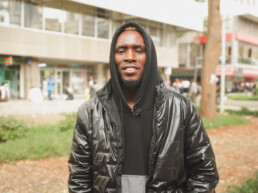Key Metrics
10,229
sexual and gender-based-violence cases supported
4,497
mental health ambassadors trained
160
Gender Champions
Impact
Our Gender and Inclusion program is able to achieve significant impact, confronting deep-rooted societal norms and structural inequalities through its integration with the 2+ million SHOFCO Urban Network (SUN) members and the active participation of community stakeholders—parents, caregivers, teachers, and local leaders—who drive and sustain long-term change. Through these trusted networks, we have mobilized 160+ Gender Champions across Kibera, Mathare, Mukuru, and Bangladesh, who work tirelessly to challenge harmful norms and advance equality at the community level.
This impact is reinforced by strong partnerships with national and county governments and health authorities. In 2023, SHOFCO played a pivotal role in shaping Kenya’s five-year National Strategic Plan to end gender-based violence (GBV). Collaborating with local law enforcement, we supported over 10,200 sexual and gender-based violence (SGBV) cases, securing 50 legal convictions. Our Safe Houses in Kibera and Mukuru are nationally recognized models of survivor support, providing critical shelter, psychosocial counseling, and access to legal and health services.
Situation
Women and girls in informal settlements face heightened risks of sexual and gender-based violence (SGBV), and femicide due to harmful gender norms, such as female genital mutilation and early marriages. This issue was exacerbated during the COVID-19 pandemic as women who lost jobs and earnings became completely dependent on their husbands or partners, and girls were home from school for an extended period.
Strategies
In 2017, SHOFCO opened its first Gender Safe House to provide temporary shelter for women and girls who had been survivors of SGBV. Today, we focus on seven key strategies:
- We operate two safe houses for survivors of SGBV, as well as offer psychosocial services support, including legal, counselling, medical, and integration.
- We train young people to become mental health ambassadors in the community across more than 80 counties and recognize and refer cases to our Gender department.
- We conduct community education and empowerment initiatives, training leaders to recognize and training leaders to prevent, recognize, and respond to SGBV.
- We partner with law enforcement and our health clinics to create a coordinated response to SGBV.
- We link survivors to our Sustainable Livelihoods programs to reduce financial dependence, which is often a contributing factor to SGBV.
- We mobilize and engage male and female Gender Champions who conduct door-to-door campaigns, support awareness activities, and drive shifts in mindsets and norms.
- We run Rights of Children Clubs and provide linkages to child services across 15 counties.
- We offer professional training for women to start eco-friendly businesses, producing items like reusable bags and bamboo furniture.
Outcomes
- A more just and equitable society is fostered by addressing systemic issues that perpetuate SGBV, and discrimination.
- Safe, supportive environments are created where women and girls can thrive, free from violence and inequality.
- Justice and support services become accessible to all, ensuring that systems protect the rights and dignity of every individual.
- Women have the knowledge, skills, and tools to excel in business and access job opportunities.
What the Future Holds
We are focused on strengthening existing child protection systems in schools and communities through improved sexual and gender-based violence prevention, case management, and access to safe houses and justice.
Key People

Caroline Sakwa
Head of Gender and Inclusion


